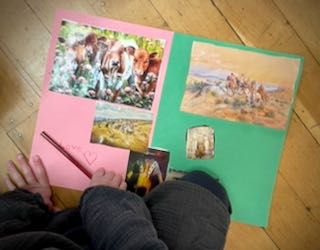Ecosystems: Everything is Connected
- neeannmarie
- Sep 10, 2024
- 2 min read

Today, all students got their hands on the books that will be using during the semester. These books are empty, and each student will enrich them with fresh knowledge and artwork inspired by our lessons.
In class this week we learned about ecosystems, and how the plants, animals, and other organisms, as well as weather and landscape, work together to form a bubble of life.
We focused on how factors within an ecosystem are interconnected, with each one relying on the others, whether it be through direct or indirect relationships. For example, a shift in the ecosystem's temperature can impact the types of plants that can thrive there. Animals that rely on these plants for sustenance and habitat will need to adjust to the changes, relocate to a different ecosystem, or face extinction.
We spent some time focusing on seals and sea otters and learned about the journey of two baby sea otters who were rescued from the coast of California were relocated to The Georgia Aquarium.
In our JR class we played a game where the students took turns being seals who had to swim through the water and under the "waves" our friends were making to gather up and eat sea urchins (balloons) before a shark could get us!


Although our focus will change each class to a different area, we will continue to revisit Ecosystems and biodiversity each week, in preparation for visiting the Ecosystems Exhibits in real life at the California Science Center, in the coming weeks.
In this video you can meet LeeRoy, a Scuba Diver at The California Science Center, as he introduces Marine Cuisine:
MORE RESOURCES:
SITE - National Marine Sanctuaries, Kelp Forests
VIDEOS - Virtual Dive Galleries
ARTICLE - Ecosystems | National Geographic
SITE - Factsheets and Coloring Sheets
ARTICLE - Understanding Species Roles in Ecosystem Survival
VIDEO - Intro to Ecosystems at The California Science Center
VIDEO - TED ed Why is biodiversity so important?
VIDEO - Why is biodiversity important - with Sir David Attenborough | The Royal Society
VIDEO - Biodiversity is collapsing worldwide. Here's why | Our Changing Climate
Our Changing ClimateOur Changing ClimateOur Changing ClimateOuOur Changing ClimateOur Changing Climate









Comments